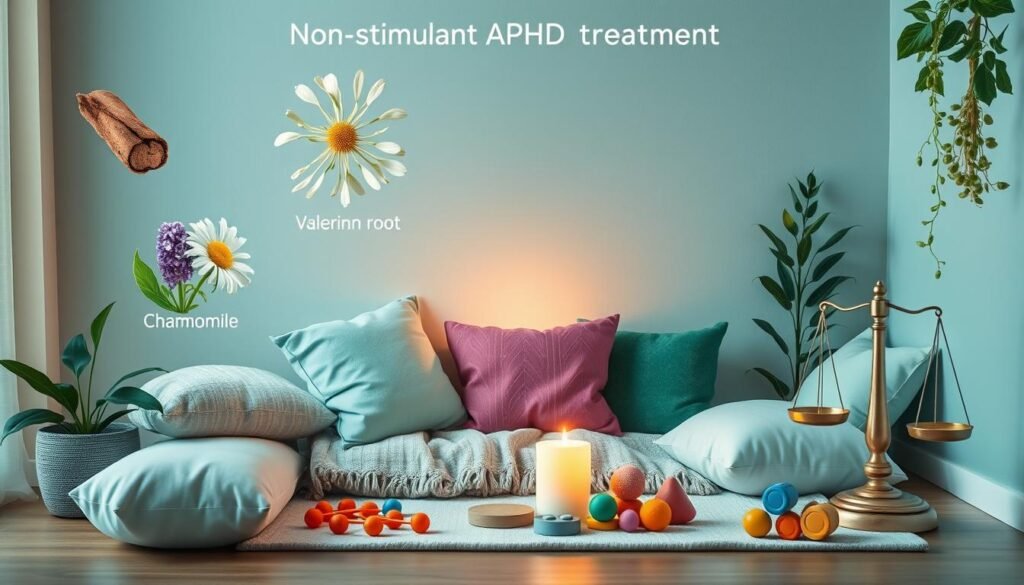Did you know up to 40% of U.S. adults experience insomnia every year? This shows how hard it can be for many to get a good night’s sleep. For people with Attention Deficit Hyperactivity Disorder (ADHD), choosing the right treatment is crucial. Qelbree is an option, but it might affect sleep. Thus, exploring the best alternatives to Qelbree becomes essential.
Approved in 2021, Qelbree has gained popularity for treating ADHD in kids and adults. However, it might lead to sleep issues like insomnia for some. By understanding these side effects and looking for other safe options, individuals can balance ADHD management with a peaceful sleep.
Key Takeaways
- Insomnia affects 40% of U.S. adults, raising concerns for those on ADHD medications.
- Qelbree may lead to sleep disturbances, necessitating exploration of alternatives.
- FDA approval of Qelbree highlights its significance in treating ADHD.
- Finding suitable alternatives to Qelbree can enhance overall wellbeing.
- Understanding ADHD medication side effects is vital for effective management.
Understanding Qelbree’s Role in ADHD Treatment
Qelbree (viloxazine) is now a key player in treating ADHD for kids and teens ages 6 to 17. It’s the first non-stimulant drug approved by the FDA since 2009, marking a big step forward. Its main goal is to change norepinephrine levels in the brain. This change helps enhance focus and lower impulsiveness in patients.
Qelbree effectively tackles ADHD symptoms. Studies show it works better than a placebo at all doses across different age groups. However, it can have side effects like messing with sleep patterns. Insomnia, drowsiness, and fatigue can happen, so it’s important to watch out for these.
Qelbree’s arrival has opened new paths for healthcare providers and families. Knowing its positives and negatives is crucial for good treatment choices. This drug sparks important conversations on managing ADHD better.
| Medication | Type | FDA Approval Year | Common Side Effects |
|---|---|---|---|
| Qelbree | Non-Stimulant | 2021 | Drowsiness, decreased appetite, insomnia, irritability |
| Strattera | Non-Stimulant | 2002 | Sleepiness, nausea, decreased appetite, fatigue |
| Ritalin | Stimulant | 1955 | Anxiety, insomnia, decreased appetite |
| Concerta | Stimulant | 2000 | Headaches, sleep problems, anxiety |
Common Side Effects of Qelbree
Qelbree is a non-stimulant ADHD medication with several possible side effects. The most usual ones are fatigue, nausea, and insomnia. While these might be mild for some, children and teens could face bigger issues. Sleep problems are a big concern. The medication can also affect appetite, leading to weight changes.
Headaches are another common complaint among those taking Qelbree. These can range from tension to migraine headaches, more so in adults. It’s vital to watch these side effects closely. Doing so helps decide if one should keep using the drug or explore other treatments.
Some severe side effects are rare but need quick action. These include suicidal thoughts, high blood pressure, and severe allergic reactions. The drug has a special warning for suicide risks, especially after starting or changing doses. Checking heart rate, blood pressure, and weight regularly is important for safety.
Alternatives to Qelbree If It Affects Sleep
If Qelbree disrupts your sleep, looking at other options is key. You can choose from non-stimulant and stimulant meds. Each type has its own pros and cons for treating ADHD.
Non-Stimulant Medications
Non-stimulants like Atomoxetine (Strattera) and Guanfacine (Intuniv) offer good results. Atomoxetine boosts attention and reduces impulsiveness. Guanfacine helps kids 6 to 17 focus better and get less distracted.
These meds usually don’t cause agitation or insomnia, which is great. But watch out for side effects like sleepiness or stomach upset. People like non-stimulants because they work smoothly for longer.
Stimulant Medications
Stimulants, such as Adderall and Vyvanse, are often chosen first. They work well but may lead to sleep issues. Still, they’re worth considering if non-stimulants aren’t effective.
Choosing the right treatment means looking at your own needs and the side effects. Below is a table with some key information about each kind of medication:
| Medication Type | Examples | Efficacy | Common Side Effects | Duration of Action |
|---|---|---|---|---|
| Non-Stimulant | Atomoxetine (Strattera), Guanfacine (Intuniv) | Improves attention span; reduces impulsivity | Sleepiness, gastrointestinal issues | Long-lasting, smoother effects |
| Stimulant | Adderall, Vyvanse | Effective for quick symptom relief | Insomnia, agitation | Immediate and extended release available |
Finding the best ADHD treatment takes time. You need to consider how it affects sleep and daily life. The right choice can really improve things for someone with ADHD.

Natural Remedies for ADHD Management
Exploring natural remedies for ADHD offers a new way to handle symptoms. Studies have shown lifestyle and diet changes can greatly help people with ADHD. For those avoiding Qelbree, these options are a great addition to their care.
Dietary Adjustments
Dietary changes are key in managing ADHD. Adding omega-3 fatty acids, found in fish and supplements, might boost focus and lower impulsivity. Reducing additives and food colorings may also lessen hyperactivity.
- Increase omega-3 intake through fish, flaxseeds, and walnuts.
- Avoid processed foods that contain artificial colors and preservatives.
- Consider essential vitamins like B6, B9, B12, and D, which have been linked to ADHD symptoms.
Talking to a healthcare provider about natural remedies for ADHD and possible nutritional needs can bring significant benefits.
Exercise and Lifestyle Changes
Exercise is crucial for ADHD management. Aim for 150 minutes of moderate activity each week to lessen restlessness and impulsivity. Exercise improves mood and brain function.
- Activities like running, swimming, and cycling are effective choices.
- Incorporating mindfulness practices such as yoga can improve concentration and reduce anxiety.
- Establishing a routine and maintaining good sleep hygiene are vital for overall well-being.
Some herbal supplements, like ginseng and chamomile, are studied for their calming effects. They may help improve focus and behavior.

Understanding Non-Stimulant ADHD Treatments
Non-stimulant ADHD treatments are great for people who don’t do well with stimulant medications. They’re especially good for those with a history of substance misuse or who get big side effects from stimulants. Atomoxetine and Guanfacine are two top non-stimulant choices that help manage ADHD well.
Atomoxetine (Strattera)
Atomoxetine, known as Strattera, is the first non-stimulant approved by the FDA for ADHD. It boosts norepinephrine in the brain to help focus. Though slower to start working than stimulants, it lasts longer. This can mean better symptom control all day. Studies show Atomoxetine might be better than stimulants in improving focus and organization, except for working memory.
The common side effects of Atomoxetine include:
- Decreased appetite
- Fatigue
- Nausea
- Insomnia
- Stomach pain
Guanfacine (Intuniv)
Guanfacine, sold as Intuniv, started as a blood pressure medicine. It’s praised for calming effects that help with impulse control and mood in ADHD patients. Guanfacine’s impact is key for those dealing with hyperactivity and distraction. It can make day-to-day tasks and socializing easier.
Potential side effects of Guanfacine include:
- Drowsiness
- Nervousness
- Slowed heartbeat
- Headaches
- Anxiety or hallucinations
Talking with a healthcare provider about your medical history is important, especially for heart-related issues with non-stimulant treatments. For more info on these and other non-stimulant ADHD options, check out this resource.

Methylphenidate-Based Alternatives
Methylphenidate is a top pick for ADHD treatment, mainly for its stimulant effects. Brands like Concerta and Ritalin stand out in managing ADHD symptoms. Understanding these options gives a clear view of available alternatives.
Concerta and Ritalin
Concerta has a special system that releases medication over time. This ensures ADHD symptoms are managed all day. It is good for those needing long-lasting focus. Ritalin offers a shorter effect, which lets users adjust the dosing.
This flexibility can meet personal treatment needs better. But, users need to watch for Ritalin effects like less appetite, stomach issues, and sleep problems.
Long-Acting Methylphenidate Options
Besides Concerta and Ritalin, there are other long-acting ADHD meds using methylphenidate. Focalin XR and Quillivant XR are among these, offering extended action. This minimizes dosing frequency while being effective. There are alternatives like Adderall XR and Vyvanse too.
They use different methods but aim for the same treatment goals. Choosing between them depends on how each person reacts to the medication. Up to 30% of patients might not find stimulant ADHD meds work for them. For detailed comparisons, check out medication insights here.
Managing ADHD Without Qelbree
Looking for ways to handle ADHD without using Qelbree usually means trying a bunch of things. Bringing behavioral therapy into the mix can make a big difference. It teaches people how to replace unhelpful habits with good ones and get along better with others.
Behavioral Therapy
Behavioral therapy is key for getting a handle on ADHD. It gives people real-life tips to deal with daily hurdles. Main perks are:
- Better organizing skills
- Sharper focus and attention
- Less troublemaking behavior
It’s made to fit each person, making other ADHD treatments work better. It partners well with medications, playing a big role in ADHD care.
Combined Treatment Approaches
Using educational and medical strategies together offers a full-plan attack on ADHD. This mix often includes meds and behavioral therapy. Highlights of this approach feature:
- Medication and therapy working better together
- Custom treatment goals
- A full scope of tackling ADHD’s mental and behavior issues
This two-pronged way underlines teamwork between doctors, families, and teachers to find effective treatments. Working as a team helps both kids and adults live richer lives. They do better overall without having to rely just on meds like Qelbree.
Consulting with Healthcare Professionals
Talking to healthcare professionals about ADHD treatment consultation is very important. It helps to make sure the treatment plan meets individual needs. Discussing symptoms, side effects, and what you hope the treatment will do is key to getting the best plan, especially if using Qelbree which might have side effects.
People taking Qelbree need to see their doctors regularly. This helps doctors check how the treatment is going and adjust it if needed. It’s also crucial to know about drug interactions, like with CYP1A2 or monoamine oxidase inhibitors, which can affect how treatments work.
Advice from healthcare experts helps patients and families make informed choices about ADHD treatment. This teamwork means patients can share their worries and look at different ways to manage ADHD that fit their life.
| Consultation Focus | Importance |
|---|---|
| Symptom Assessment | Identifying specific challenges experienced by the individual. |
| Medication Review | Evaluating efficacy and side effects of current medications. |
| Follow-Up Scheduling | Ensuring ongoing support and timely adjustments as needed. |
| Patient Education | Providing information on interactions and treatment options. |
| Collaborative Decision-Making | Empowering patients to participate actively in their treatment plans. |
Working closely with healthcare professionals helps make ADHD treatment more effective. It makes the treatment better suited to the patient, encouraging progress that lasts.
Conclusion
Qelbree is one valuable choice for ADHD treatment but may not work for everyone. People with sleep issues might need to look elsewhere. There are other options like atomoxetine and guanfacine. Trying lifestyle adjustments for better sleep and health is also recommended.
Not all ADHD management needs medication. Things like therapy, eating right, and staying active can make a big difference. They can boost your life quality. Finding the right ADHD treatment means looking at what works for you personally.
Managing ADHD is a journey that should include professional advice. Healthcare providers can help explore different ADHD treatments. This ensures a plan that fits. Being open to trying new strategies can lead to the best way to live well with ADHD.